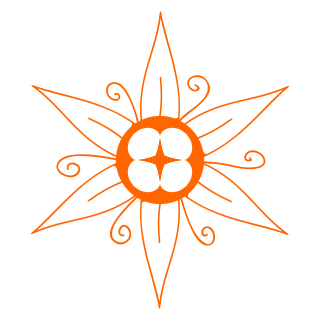
According to the Samkhya philosophy/model (overview offered here) the Gunas co-exist in all manifest things, including our bodies and minds ... so we can benefit our Yoga practice by working with an understanding of the model.
"A yogi is one who can change their gunas"
Sri Krishnamacarya.

Pronounced : Goo-nuhs.
The three gunas (derived from; thread, strand, twirl, wind) are the prime powers that make up and run through allPrakriti/Matter/Substance (see link above).
They are the primary ingredients of all nature.
They are not existent in set quantities but fluctuate in varying proportions, one or another being dominant.
Variable combinations of the gunas flows through all the myriad diversity in the material world.
All things are fundamentally affected by the interplay between these influences.
Evolution is only possible through the tension between these forces.
All objects in the cosmos have certain qualities which make them what they are, the qualities of any individual thing are due to its particular combination of gunas.
"The world is the play of the gunas - the universal energies of light, motion and mass.
They take form as the elements and the senses.
The purpose of the world is to provide us with experience and thus lead us to liberation."
Alistair Shearer (YS 2.18)

Interwoven
The gunas are three interwoven threads/strands/twirls:
- Sattva
- Rajas
- Tamas
Sattva
Sattva is the power that illuminates and reveals.
It is clear, calm and balanced.
It is harmony and purity.
It appears as light and is our inherent natural state.
One who is established in Sattva is content.
Sattva leads us to higher states of being.
We experience Sattva as balance, harmony, coherence, clarity, joy, contentment.
Rajas
Rajas is the power that stimulates and moves.
It is dynamism, passion and activation.
Rajas is that which gives force and motion.
It prompts action.
We experience it as compulsion, agitation, drive, desire, attachment.
Tamas
Tamas is the power that obscures.
It is darkness, heaviness, gravity.
Tamas restrains, obstructs, envelops and binds.
It resists motion.
We experience it as lethargy, tiredness, apathy, dullness, slowness.

Conclusion
The gunas flow through all manifestation.
The goal of Yoga is unlimited freedom through the understanding of our hidden, true nature.
The gunas provide us with a model to engage with, to guide us towards that understanding, and by which we can achieve greater joy, harmony and balance in our daily lives.
In Yoga we can work to reduce the effects of Rajas and Tamas and to increase that of Sattva choosing and modifying our practices (and indeed our everyday behaviour/lifestyle) in order to find solutions to imbalances that are appropriate to our own personal needs.
In future articles I will employ the guna model to demonstrate ways of effectively working with the ideas therein into our Yoga practice.


Thanks for sharing, I didn't know these terms before.
Hey @tommycordero,
Thanks.
I hope you find them useful.
Love & Peace & Freedom
It is a belief in Ayurveda that the balance of these gunas is fundamental to physical health of the body. For example, if the three gunas (or Doshas in Ayurved) are in perfect harmony, your internal resistance to disease grows to a point where nothing can penetrate and the body is disease free.
In fact there is a powerful herbal medicine in Ayurveda called Triphala which is known to be "Tridoshic", meaning it has the potential to balance the three gunas in the body, keeping it healthy and disease free.
Thanks @norbu,
Yes, indeed.
Ayurveda and Yoga are closely related, as you know I'm sure.
Triphala does sound very awesome.
I've never felt the need myself but I know friends who have had great results with it.
Your blog is v interesting and varied!
Following.
😊
Love & Peace & Freedom
I see a lot on your blog which interests me too! Followed you back and thanks!
Also people seem to think triphala is for constipation only, it is not! It is quite the concoction!